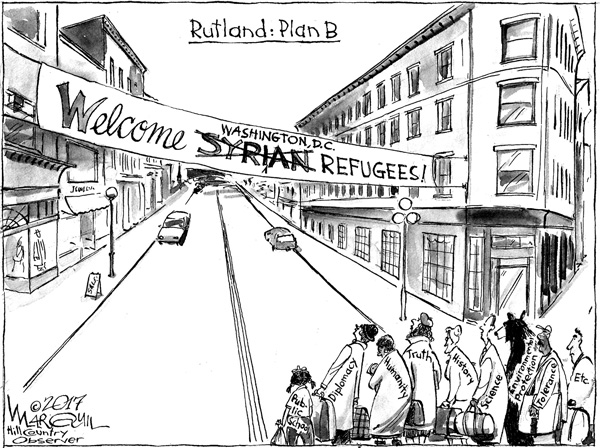Editorial February-March 2017
E D I T O R I A L
Rutland becomes microcosm in immigration crackdown
 When Mayor Christopher Louras announced last April that he’d volunteered Rutland as the new home for 100 refugees from the Syrian civil war, he could scarcely have imagined how fully and quickly his city would be engulfed by the toxic propaganda of a growing national anti-immigration movement.
When Mayor Christopher Louras announced last April that he’d volunteered Rutland as the new home for 100 refugees from the Syrian civil war, he could scarcely have imagined how fully and quickly his city would be engulfed by the toxic propaganda of a growing national anti-immigration movement.
But by June, the online “Breitbart News” site featured a breathless story about how the mayor of a “small Vermont town” had “met in secret with representatives of the refugee resettlement industry, offering his town as a new resettlement destination for unvetted Syrian migrants.”
Like a lot of things on Breitbart, the report was a mixture of fact and fiction, with the chief fiction in this one sentence being the claim that refugees from Syria were “unvetted.”
In fact, Syrian refugees to the United States at that point were subject to a review process that included multiple background checks and fingerprint screenings to ensure they were not on any law enforcement or intelligence databases of people with terrorist links or criminal records. The vetting process, which took up to two years to complete, included extensive in-person interviews and required that each refugee be cleared by multiple federal agencies, including the Department of Homeland Security.
But why fuss about facts? As we now know, the editor of Breitbart, Steve Bannon, went on to become Donald Trump’s campaign manager and rode his way to the White House, where he now sits on the National Security Council.
Bannon in his new role was deeply involved in crafting the executive order the new president signed in late January to shut down immigration for 90 days from seven Muslim-majority countries in the Middle East. That order also slashed, by more than half, the number of refugees the nation will accept from around the globe – and it indefinitely halted admission of refugees from Syria.
Back in Rutland, as a story in this issue details, local volunteers were gearing up to welcome 25 to 30 families of Syrian refugees who were expected to arrive in the city this year. But just two families made it to Rutland before President Trump closed the door on the rest.
For Trump, who ran the most virulently anti-immigration presidential campaign in memory, shutting off the flow of refugees could well be just the first in a series of get-tough actions that would threaten the economy of our region. What will happen next? Will he slash or strangle the H1-B visa program that provides foreign high-tech workers to the GlobalFoundries chip-making complex in Saratoga County?
Will immigration agents round up and deport the many undocumented workers at dairy farms across New York and Vermont? If they do, the flow of milk will stop.
At some point, the facts and the truth will catch up to the whipped-up hysteria.
In Rutland, where a shrinking population and a stagnant economy are intertwined, Mayor Louras was right to think that refugee resettlement would help breathe new life into his city. The experience of other cities around the Northeast that have accepted significant numbers of refugees -- from Utica, N.Y., to Allentown, Pa. – has borne that out.
Unlike immigrants who come to this country for economic reasons, refugees are by definition fleeing war or persecution. To shut them out, after promising to take them in, is particularly cruel. And there is no doubt that for many, our shifting policy is a matter of life and death.

